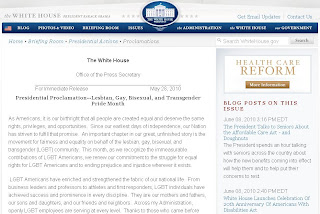 from our allies at the Servicemembers Legal Defense Network, here is a guide to the end of "Don't Ask, Don't Tell" - cross-posted at their site.
from our allies at the Servicemembers Legal Defense Network, here is a guide to the end of "Don't Ask, Don't Tell" - cross-posted at their site.REPORTER GUIDE: The Path Forward on the Repeal of “Don’t Ask, Don’t Tell”
WASHINGTON, D.C. – Servicemembers Legal Defense Network (SLDN), a national, legal services and policy organization dedicated to ending "Don't Ask, Don't Tell" (DADT), released a guide today on the path to repeal.
THE SENATE VOTE:
After the U.S. House of Representatives passed the National Defense Authorization Act (NDAA), the U.S. Senate is now poised to take it up. An amendment that would allow for the repeal of “Don’t Ask, Don’t Tell” was successfully attached to the NDAA in both the House and Senate.
Senate floor debate on the NDAA may begin as early as June 18, but it could come later.
SLDN and other repeal advocates will be working to shore up a filibuster proof majority, 60 Senate votes, to proceed to consideration of the NDAA. While this is traditionally a “must-pass” piece of legislation, the White House has threatened to veto the bill due to spending disagreements unrelated to the repeal of DADT.
Even with a filibuster proof 60-vote majority, SLDN and our repeal allies will be closely watching for any crippling amendments offered on the floor and a “motion to strike” that could allow repeal opponents to remove the repeal language from the defense bill.
SLDN is working closely with Senators Joseph Lieberman and Carl Levin to guard against any attempts to strike repeal or weaken its provisions.
For instance, we will vigorously oppose any amendment to expand the certification process in the “compromise." Opponents of open service may be considering an amendment that would require all of the Joints Chiefs to sign off on the certificaiton process. This killer amendment is designed to delay open service for years.
CONFERENCE COMMITTEE:
After passage in the Senate, repeal advocates will focus on the conference committee where staff work would begin shortly thereafter. The committee will be tasked with resolving any differences in the House and Senate versions of the NDAA. At this time, the language in the repeal amendment for DADT is the same in both chambers – a good thing.
With similar amendment language in both chambers, there will be little to resolve. However, SLDN does not under estimate the “Big Four.” The “Big Four” are the chairs and ranking members in the House and Senate Armed Services Committees. Only one of the four supports repeal: Senate Chairman Carl Levin. The ranking member in the Senate, Sen. John McCain, and House Chairman Ike Skelton and ranking member Rep. Howard McKeon, do not.
The conference committee will produce a conference report and we expect a vote in both the House and Senate chambers on that report in September or early October.
PRESIDENTIAL BILL SIGNING:
Generally, the NDAA is signed each year in late October or early November. When the president signs the NDAA – with the repeal amendment attached – nothing would happen. “Don’t Ask, Don’t Tell” will still be the law. Service members will still be discharged. Read SLDN’s warnings: www.sldn.org/StillAtRisk.
THE PENTAGON WORKING GROUP REPORT:
On or before December 1, the Pentagon Working Group is required to submit its report to Congress and the Secretary of Defense. The working group was established to author a report on “how” to implement repeal, not “if” repeal should happen.
CERTIFICATION:
At some point after the Pentagon Working Group submits its report, the President would transmit to the congressional Armed Services Committees a written certification, signed by the President, the Secretary of Defense, and the Chairman of the Joint Chiefs of Staff, stating each of the following:
(A) That the President, the Secretary of Defense, and the Chairman of the Joint Chiefs of Staff have considered the recommendations contained in the report and the report’s proposed plan of action.
(B) That the Department of Defense has prepared the necessary policies and regulations to exercise the discretion provided by the amendments made by subsection (f)
(C) That the implementation of necessary policies and regulations pursuant to the discretion provided by the amendments made by subsection (f) is consistent with the standards of military readiness, military effectiveness, unit cohesion, and recruiting and retention of the Armed Forces.
“Don’t Ask, Don’t Tell” will still be the law at this point. Service members will still be discharged. Read SLDN’s warnings: www.sldn.org/StillAtRisk.
REPEAL EFFECTIVE 60-DAYS AFTER TRANSMITTAL:
After the President transmits written certification to the congressional Armed Services Committees, full repeal of “Don’t Ask, Don’t Tell” would be effective 60 days later.
OPEN SERVICE:
Repealing “Don’t Ask, Don’t Tell” would NOT automatically allow for “open service.” Policies and regulations to allow gays and lesbians to serve openly would need to be written and put in place. SLDN will also encourage the President to issue an executive order protecting service members from discrimination based on their actual or perceived sexual orientation.
Servicemembers Legal Defense Network (www.sldn.org) is a national, non-profit legal services and policy organization dedicated to ending “Don’t Ask, Don’t Tell.”
Elizabeth A. Shirey
Grassroots/Policy Advocate
Servicemembers Legal Defense Network
read on


